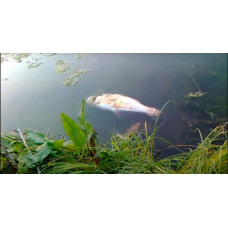Latin in, in + Greek toxikon poison.
Fish intoxication - poisoning caused by the action of toxins of microbial, plant and animal origin. Fish intoxication is often caused by the action of harmful substances entering the water body.
Fish poisoning, fish diseases arising under the influence of poisonous substances, mainly of exogenous origin. The main causes are anthropogenic sources caused by human activity (industrial and domestic sewage, oil and petroleum products, pesticides, detergents) and natural (appearance in the water body of a large number of poisonous metabolites in the mass development of blue-green algae or significant amounts of hydrogen sulfide, carbonic acid, methane and other toxic substances formed by the decay of dead aquatic organisms).
Usually an anthropogenic source dominates and is amplified by a natural source. Fish poisoning also occurs with a significant decrease in the concentration of dissolved oxygen in the water, arising from an increase in the amount of organic matter in water bodies and a decrease in oxygen supply from outside. Such fish starvation from lack of oxygen occurs mainly in winter time in waterlogged rivers and at discharge of sewage containing a large amount of organic substances (domestic sewage, sewage from livestock farms, sugar and breweries and other food industry enterprises).
Poisonous substances enter the body of fish through the gills, skin and with food. The course of the disease can be acute and chronic. Acute course is accompanied by mass death of fish. Symptoms of O. r. and pathological changes depend on the nature of the toxic substance. In diseased fish noted changes in behavior (inversion, lateral position, etc.), enlargement and hyperemia of internal organs, erosion of scales, hemorrhages in the eyes, morphological and other changes in blood.
Intoxication of fish
Tags: intoxication of fish

